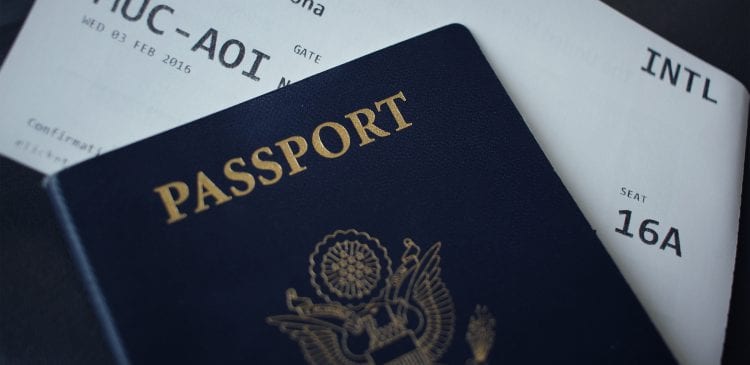Back Taxes: The IRS Has Power to Revoke Your Passport

When you owe back taxes, the Internal Revenue Service uses a number of methods to collect payments. These collection methods include adding penalties and interest to debt, filing tax liens, issuing levies, garnishing wages, and seizing property. As part of a December 2015 transportation bill, the IRS now has the ability to revoke passports of serious tax offenders.
If you owe more than $50,000 in tax-related debt including penalties and interest, the IRS can revoke your passport at any time. This new provision allows the Department of Treasury and the IRS to authorize the State Department to take away U.S. passports for individuals with serious tax debt. The State Department now has the authority to deny, revoke or limit taxpayers’ use of a U.S. passport. In addition to this, the State is not supposed to issue new passports to any individual with serious tax debts. As the law states now, the State Department will act upon the new legislation when told by the IRS to do so.
When can the IRS Revoke your Passport
Your passport can be revoked both when you are in the country and when you are traveling out of the country. For example, you could be on a trip to Europe and the government could revoke your passport not allowing you to return to the United States. It is important to note exceptions can be made for emergencies and humanitarian reasons. If you have already been working with the IRS to pay off your back taxes, the new passport-revoking provisions do not apply to you. Additionally, if you are under a signed installment agreement, you will still be able to travel.
This new collection method was put into place as part of a larger effort to collect unpaid debt. Last year, the IRS reported over $400 billion owed in assessed taxes, interest and penalties, also known as the Tax GapThis significant amount of delinquent debt has contributed to the overall national debt leading the IRS to get repeatedly cited. According to Congressional analysts, the new rule will raise roughly $400 million in the next ten years, a seemingly drop in the bucket when compared to the Tax Gap.
The new bill dates back to 2012, when the Government Accountability Office first reported on potentially using passports to collect taxes. When the idea was first proposed, it created some controversy within Congress; however, when the bill was presented this time, it was packaged within a larger highway funding bill and passed without any issues.
Some people find the new bill to be controversial, as passports may be required for domestic travel beginning this year. After September 11th, 2001 the United States issued the Real ID Act, which was put into place to tighten access to federal facilities. Part of the Real ID Act created a national standard for state-issued IDs; however, four states, Louisiana, Minnesota, New Hampshire and New York did not comply, potentially making their IDs no longer valid for domestic flights.
This means individuals from these states must use their passports to fly within the United States, which creates an issue if passports are revoked for tax debt issues. In addition to the four states listed above, the Los Angeles Times reported that 26 states, including California, do not meet the federal ID regulations. These states have until October 2016 to comply with the regulations or residents from those states may also need passports to travel domestically.
The New Law & Tax Liens
The new law is not limited to criminal tax cases. In fact, if the IRS has filed a notice of lien, your passport could be revoked. A tax lien is the government’s way to secure its interest in your assets and facilitate the collection of your tax liability. After a lien is filed, the government has the right to all of your property, including any property you acquire after the lien. The court then uses liens to determine priority in bankruptcy and real estate sales. The IRS can file a Notice of Federal Lien after:
– The liability is assessed
– Notice and Demand for payment have been sent; and
– You fail to pay in full within 10 days
There have been cases where tax liens have been erroneously filed by the IRS, only to be rectified by straightening out paperwork and case facts with the agency. It is important to understand tax liens as they relate to the new passport-revoking law. Historically, the right to travel is established between states and international countries, raising some questions about the constitutionality of this new law. As new travel guidelines are finalized, it is not yet clear if the new law will stay in place or will be subject to judicial review.
The most important thing you as a taxpayer can do is to ensure you have a resolution in place to address your tax debt. If you are having issues with back taxes, audits, tax liens or levies, let us help. Landmark Tax Group is a professional tax resolution company that specializes in State and Federal IRS tax debt help. Our tax relief company can help with IRS problems and ensure your tax resolution has the best possible outcome.
If you are looking for tax relief companies that have ex-IRS agents and years of experience dealing with IRS issues. Look no further. Not all taxpayers qualify for the programs provided by the IRS, but our experienced personnel of Licensed Enrolled Agents, Tax Resolution Specialists, and former IRS Agents will navigate you through the collection process and assess your financial situation to find the best course of action.
Get help with your IRS back taxes or debt problems by contacting us today for your Confidential Consultation.
Get our Free Special Report: 7 Secrets the IRS Doesn’t Want You to Know!
Not only are we licensed Tax Relief Specialists, we are also former Senior IRS Agents that now serve the best interests of taxpayers like you – all we do is handle IRS Tax Relief matters, all day, every day. Speak to us now at (949) 260-4770.
If you would like us to review your tax notices for Free, contact Landmark Tax Group now for a confidential consultation.

